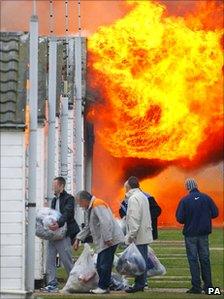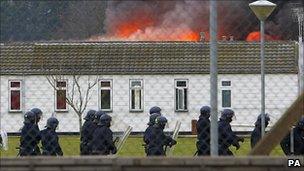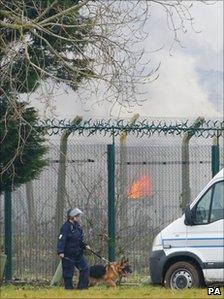Ford prison riot puts spotlight back on open jails
- Published

Ex-Fleet Air Arm billets make up much of Ford's living accommodation
Violence broke out at Ford open prison, West Sussex, on New Year's Day, with fire destroying buildings and staff taking almost 22 hours to bring the situation under control.
Open prisons have long been controversial, with critics targeting their more relaxed security regimes which involve inmates wandering freely and often living in single rooms with their own keys.
Classed as Category D, for prisoners whom the authorities least expect to escape, they generally house prisoners who are approaching release and white-collar criminals jailed for crimes like fraud.
However, those convicted of serious crimes including murder and rape - but assessed as low risk - can also spend time in open prisons towards the end of their sentence.
The role of open prisons came under scrutiny in 2006, when the Prison Service admitted some 700 offenders had absconded from the sites in a year.
At Ford, a former Fleet Air Arm station converted to a jail in 1960, 11 foreign prisoners went on the loose in a month amid a national outcry over the handling of criminals from other countries.
Then, in January 2007, prisons minister Gerry Sutcliffe admitted it was impossible to stop inmates walking out of open jails.
Conservative Nick Herbert, the local MP for Ford and now a criminal justice minister, described the jail as a "laughing stock" and claimed two prisoners a week were simply walking away.
A leaked memo from its then governor Fiona Radford had suggested higher-risk prisoners "who should really be in Category C conditions" were being housed there.
'Visiting pubs'
Meanwhile, the Prison Officers' Association said it was "extremely concerned" about the number of prisoners with violent records being managed in open jails, after five convicted killers absconded from Sudbury open prison in a month.
At the time, Mr Sutcliffe said the number of inmates absconding from Ford had fallen from a high of 143 in 2003/4 to 47 in the year to November 2006 - although Mr Herbert claimed the latter figure was 61, including 33 foreign nationals.

There have been complaints about the security of Ford's perimeter fence
A retired prison officer had said a gap in the jail's security fence had been "a permanent fixture for years", while prisoners had been seen drinking in local pubs and hiring taxis to collect "up to 30 fish suppers at a time", Mr Herbert complained.
Ford's site is split by a main road, with one side taken up mainly by residential blocks, and the other by workshops . While it accepts prisoners with less than two years left to serve, those convicted of particular crimes including arson and sex offences are not admitted.
After a risk assessment, prisoners can apply for day release - up to four times per month - or even stretches of up to five days' overnight release, depending on their sentence criteria.
All inmates are required to work on site, although longer-serving prisoners may also qualify to carry out five days' community work in a week and eventually take up to six days' paid work in a week.
With the suggestion that alcohol played a part in the New Year riot, various people with experience of Ford say it is not surprising.
One prison officer, who has experience of open prisons and currently works in East Midlands, said the relative freedom of inmates, coupled with the low number of staff, meant rules were easy to break.
Those prisoners who leave the site, for work or day release, can "get alcohol any way they want. It's a massive area with minimal staff, so it's easy to get stuff in".
'Drinks cabinet'

According to one former inmate, food was regularly thrown over the fence for inmates
He suggested breathalysing inmates at this time of year would have been a judgement call for staff, with some "turning a blind eye" to drinking.
Michael Bunting, a former police officer who served time at Ford for an assault conviction in 1999, said during his time there he knew of one prisoner who "had a drinks 'cabinet' containing bottles of whiskey, rum, Bacardi and gin".
Mr Bunting add: "When I refused to drink, I was beaten. The prison officers did nothing to protect me."
He said he was unsure how the alcohol entered the prison, but said it could have been delivered by family members who would also throw take-away food over the perimeter fence for inmates.
He said one "top dog", who everybody, including staff, feared, would turn out for roll-call having "obviously" been drinking.
"There is no doubt that prison officers were aware of it, and for whatever reason they chose to ignore it," he told the BBC.
Of his own experience a decade ago, he found staff "intimidating and extremely provocative" in certain scenarios, and said he was not surprised that a riot had kicked off, but was only surprised it had not happened earlier.
Ford has housed a number of high-profile inmates. George Best played football for the prison team whilst serving time there in 1984 for drink-driving, assaulting a police officer and failing to answer bail.
Other famous residents have included ex-MI5 agent David Shayler, who was jailed for breaking the Official Secrets Act, and three of the so-called "Guinness four" share-trade fraudsters; Ernest Saunders, Anthony Parnes and Gerald Ronson.
After an October 2008 visit, Chief Inspector of Prisons Dame Anne Owers found that inmates were easily able to smuggle in alcohol, with just two officers and four support staff on duty at night.
"Large amounts" of alcohol were not uncommon, inspectors noted, with staff discovering 30 bottles of vodka after the 2008 Easter weekend.
Drugs and mobiles
In the week before the inspection, Dame Anne said five unidentified prisoners had donned masks to attack another inmate. Her report suggested prisoners were also leaving the compound to bring in drugs and mobile phones.
The 557-capacity Ford came in for more criticism in 2009, when burglars were found to be breaking in through the easily-accessible perimeter fence to steal equipment from workshops.
However, the jail's Independent Monitoring Board praised its injection-moulding workshop for winning a contract making plastic poppy stems for the Royal British Legion.
The report highlighted the need for more funding to combat "another year of a continuing lack of investment in an old prison".
With up to 40 prisoners involved in the New Year riot, amid suggestions that alcohol fuelled the violence, the role of Ford in particular - and open prisons in general - is likely to come under scrutiny once again.
- Published1 January 2011